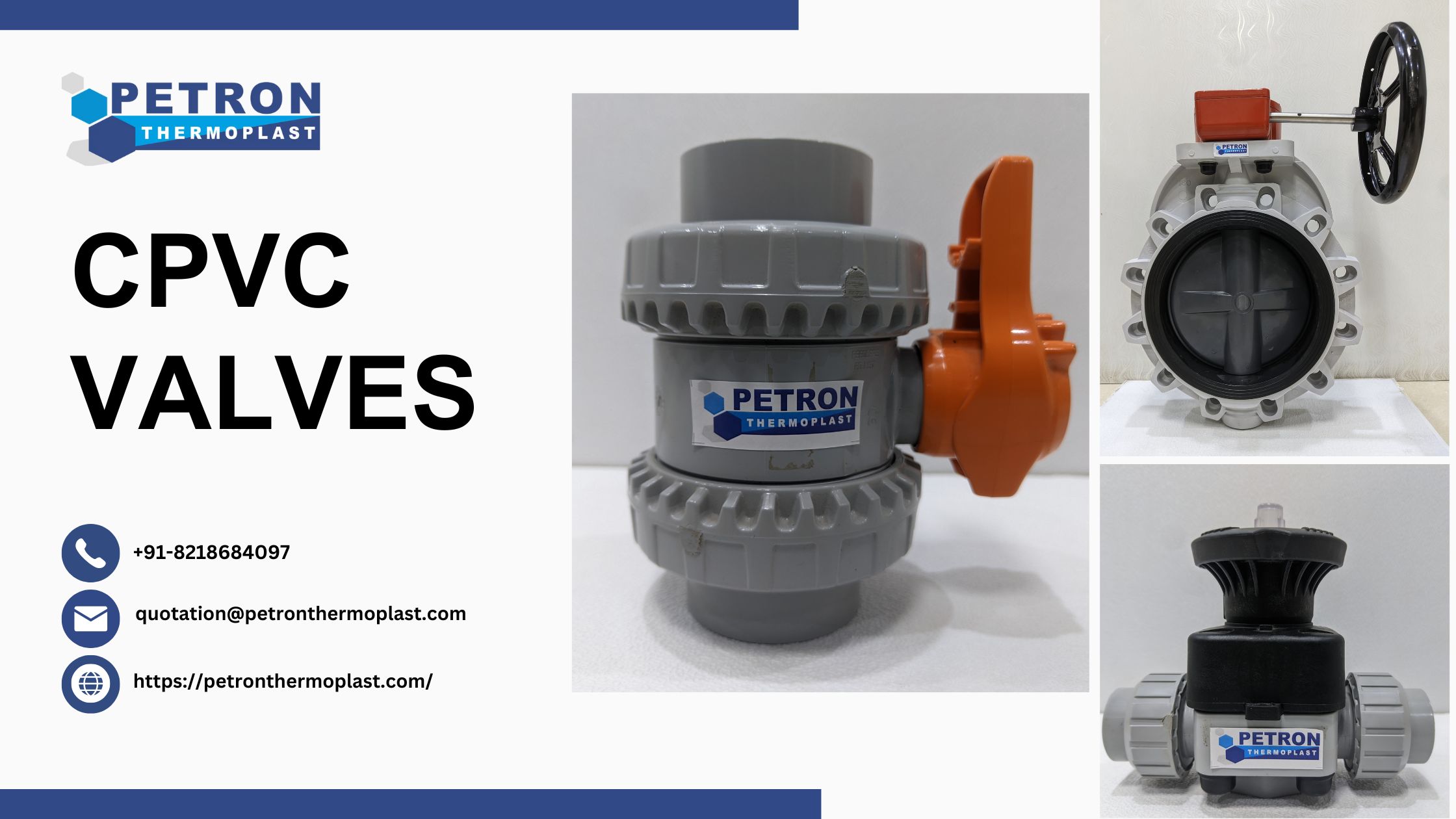In industries where chemical processing and handling are critical to operations—such as pharmaceuticals, water treatment, petrochemicals, and manufacturing—the choice of piping components plays a key role in system reliability, safety, and cost-efficiency. Among the various materials available for industrial valves, CPVC (Chlorinated Polyvinyl Chloride) has emerged as a preferred solution due to its exceptional chemical resistance, thermal stability, and mechanical strength. This article explores how CPVC valves contribute to enhanced chemical handling efficiency across various industrial sectors.
What Are CPVC Valves?
CPVC valves are flow control devices manufactured from CPVC, a thermoplastic that is produced by chlorinating PVC resin. This additional chlorination process significantly increases the material’s temperature and chemical resistance, making it suitable for aggressive environments and corrosive chemical applications.
These valves are available in various types, such as:
- Ball Valves
- Check Valves
- Butterfly Valves
- Diaphragm Valves
- Gate Valves
Each type serves a different function depending on system requirements, but all are built to offer leak-proof performance, long service life, and ease of maintenance.
Key Benefits of CPVC Valves in Chemical Handling
- Outstanding Chemical Resistance
CPVC is inherently resistant to a wide range of corrosive substances including acids, alkalis, salts, and other industrial solvents. This property makes CPVC valves ideal for chemical handling systems, as they can safely transport fluids that would degrade metal or other plastic valves.
Applications:
- Acid and base transport lines
- Wastewater neutralization systems
- Chemical dosing equipment
- Superior Temperature Tolerance
CPVC valves can withstand higher operating temperatures compared to standard PVC valves—typically up to 93°C (200°F). This makes them highly suitable for applications involving heated chemical solutions or hot water systems used in cleaning and processing tasks.
Efficiency Impact:
- Enables reliable operation in temperature-intensive environments
- Reduces the risk of valve deformation or failure due to thermal stress
- Low Maintenance and Long Service Life
Unlike metal valves, CPVC valves do not rust, corrode, or scale. These results in reduced maintenance intervals, fewer replacements, and minimized downtime—key factors in ensuring operational efficiency in chemical plants.
Maintenance Advantages:
- No need for internal or external corrosion protection
- Lower maintenance costs over the valve’s lifecycle
- Minimal system contamination due to valve degradation
- Lightweight and Easy Installation
CPVC valves are significantly lighter than metal alternatives, making them easier and faster to install. They can be joined using simple solvent cementing or threaded connections, which eliminates the need for welding or heavy equipment.
Installation Efficiency:
- Lower labor costs
- Shorter system setup times
- Easy integration with existing CPVC or PVC piping systems
- Non-Conductive and Safe
Being a non-metallic material, CPVC does not conduct electricity, making CPVC valves safe for use in electrical hazard zones. This also helps prevent galvanic corrosion, which can occur when dissimilar metals are used in a system.
Safety Benefits:
- Reduces risks in electrically sensitive environments
- Improves longevity when installed with other plastic components
Applications of CPVC Valves in Chemical Handling Systems
- Water Treatment and Purification
CPVC valves are used in dosing systems for injecting chemicals like chlorine, alum, and sodium hypochlorite into water supplies. Their resistance to aggressive disinfectants makes them ideal for this application.
- Pharmaceutical Manufacturing
In pharma facilities, CPVC valves help control fluid transfer in systems handling acids, solvents, and other sensitive compounds that require contamination-free and chemically stable environments.
- Chemical Processing Plants
Chemical plants use CPVC valves in storage tank lines, transfer systems, and reactors where strong acids or caustics are handled at elevated temperatures.
- Pulp and Paper Industry
The industry involves bleaching and coloring processes that utilize harsh chemicals. CPVC valves offer the necessary durability and reliability in such corrosive conditions.
- Food and Beverage Processing
Though less common, CPVC valves are also used in non-critical areas of food-grade systems where chemical cleaners or disinfectants are regularly used.
How CPVC Valves Improve Efficiency?
Efficiency in chemical handling involves reducing downtime, minimizing waste, ensuring safety, and optimizing process control. CPVC valves contribute to all these factors by:
- Providing leak-proof operation that avoids chemical loss
- Requiring minimal maintenance, reducing labor and repair costs
- Ensuring safe handling of aggressive chemicals at high temperatures
- Enabling fast installation and replacement, reducing system downtime
- Offering a longer service life, resulting in lower total cost of ownership
Environmental and Economic Advantages
CPVC valves are recyclable and consume less energy during production than metal alternatives. Their lightweight nature also translates into lower transportation costs. All these attributes contribute to a more sustainable and cost-effective solution for industries focused on improving environmental responsibility while maintaining operational excellence.
Choosing the Right CPVC Valve
When selecting a CPVC valve for your system, consider the following:
- Type of chemical handled
- Operating temperature and pressure
- Valve size and flow rate requirements
- Installation method and connection type
- Certifications for industrial or potable water use
Always opt for valves from trusted manufacturers to ensure consistent quality and durability.
Why Choose Petron Thermoplast for CPVC Valves?
As a leading supplier of industrial plastic valves and fittings in the Middle East, Petron Thermoplast offers a wide range of CPVC valves engineered for industrial-grade performance. Our valves are tested for leak-proof operation, corrosion resistance, and high thermal stability. We support clients across industries with customized solutions, prompt delivery, and reliable after-sales service.
Conclusion
CPVC valves have revolutionized chemical handling systems with superior chemical resistance, heat tolerance, and low maintenance demands. For industries seeking a cost-effective, reliable, and safe solution to manage corrosive fluids, CPVC valves offer unmatched value. By choosing CPVC valves from a reputable supplier like Petron Thermoplast, businesses can enhance operational efficiency, extend equipment life, and ensure consistent system performance.

